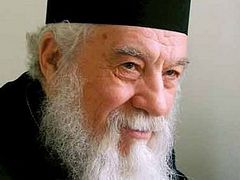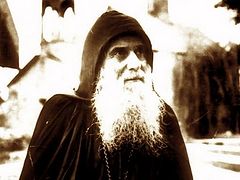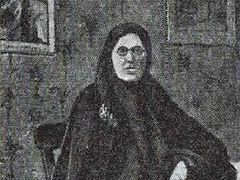 Archimandrite Parten (Aptsiauri)
Archimandrite Parten (Aptsiauri)
Today the village of Dumatskho in the Tianeti municipality [in the region of Mtskheta-Mtianeti mostly in Eastern Georgia and partly in South Ossetia.—Trans.] is a bare pin-prick on the map, and no wonder that as early as 1904 it was an insignificant spot. The landscape is the same across the area, as far as the eye can see: mountains, mountains, and more mountains. Nothing changes from year to year, from century to century. The only remarkable landmark nearby is the Gergeti Holy Trinity Church. The church can be seen from all sides. It stands on the top of a mountain, and the rays of the rising sun gild its conical dome and bell-tower in a different way every time.
It was then, at the dawn of the twentieth century, that the following news spread around the highland village. Alexei Aptsiauri’s long-awaited son was born. He had been childless for a long time, but now the man was blessed with this joy. It was said that the father had even taken a vow:
“Lord, make me worthy to have a child, if only one child; then I will dedicate him to Thee!”
Thus little John (Ioane) was born. The fellow villagers rejoiced at Alexei’s happiness, congratulated him, and continued to lead their normal life, grazing their livestock and picking fruits, which are scarce in mountainous regions with poor soil. Three years later, the news spread around Dumatskho again: Alexei Aptsiauri’s little son (who had been literally “obtained by prayer” of many years) suddenly fell sick and died.
The whole village visited the grieving family to comfort them.
Amid the general grief and lamentation a certain blind monk entered the house and addressed the inconsolable father:
“Alexei, do you remember the promise you made—namely that your son would become a monk?”
“I wouldn’t have broken the promise. But what can I do now? How can I bring my dead son back to life?” Alexei replied, weeping.
“Arise and make this oath: if your son comes back to life, you will truly raise him as a servant of God. And, as is the custom among the Mtiuli people [an ancient ethnic group in that mountainous region of Georgia.—Trans.], make a notch on the main pillar of the house in testimony!”
Alexei stood up, holding his lifeless son in his arms. And as soon as he had made a notch on the wooden pillar with his dagger, the child opened his eyes. Beside himself with joy, he at once made another notch.
When John turned five, he was sent to a local school. The boy did well at school, but he stood out from the rest of his peers: he was very spiritual and kept the fasts from early childhood…
Alexei tended sheep to provide for his family. In 1917, his flock of sheep was stolen by some Kist people [a small ethnic group related to Chechens, living mainly in the Pankisi Gorge in northeastern Georgia.—Trans.], so the family had to move to Vladikavkaz [the capital of North Ossetia—an autonomous republic of Russia, in the Caucasus on the border with Georgia.—Trans.]. Immersed in worldly cares, Alexei forgot his oath and decided to find a suitable wife for his sixteen-year-old son. For this purpose he sent John to one Georgian family to introduce him to his potential future fiancée, but the young man suddenly ran away.
When Alexei learned about this, he got very angry and began to shout at his son:
“Either you obey me or you leave our home!”
First John grew sad, but then became happy:
“Now I will be free, and no one will prevent me from becoming a monk!”
He asked for his dying mother’s blessing and left the parents’ home.
Alexei nearly went mad when he got home and didn’t find his son there. He got many people involved in the search for his lost son. At last the man figured out what monks might have sheltered John. So Alexei appealed to George Shiolashvili, the father of Ilia II, the current Catholicos-Patriarch of All Georgia:
“What if he heeds your advice and decides not to become a monk?”
However, the reality didn’t live up to his expectations.
Later, when John met with his father, he confessed:
“What can I do if I love God above all things and there is no place for me in this world?”
And he went to Shio-Mgvime Monastery (the Monastery of St. Shio).
At that time the abbot of the monastery was Hieromonk Ephraim (the future Patriarch Ephraim II). He was very surprised by the young man’s desire. In those days a mere handful of people sought the monastic life. Fr. Ephraim allowed John to live at the monastery and assigned him to graze livestock.
John would work all day long and spend the whole night in prayer.
After that he lived at the Holy Trinity Monastery in the forest of Dzegvi for three years until he received the tonsure. Next Bishop Pavel (Japaridze) of Tsilkani blessed him to serve as a psalm-reader at Svetitskhoveli Cathedral. Then he sent John to Zedazeni Monastery for two years to attend up on an old monk. In 1929, Bishop Pavel tonsured John a monk with the name Parten/Parthenius. In 1932, Bishop Alexei (Gersamia) ordained him a hierodeacon. In 1935, Catholicos-Patriarch Callistrat (Tsintsadze) sent Fr. Parten back to Shio-Mgvime Monastery.
Five years later Fr. Parten returned to Dzegvi, where his life conditions were very hard. Once some thieves attacked him, but he survived. Afterwards one of the robbers recalled:
“We saw a monk who had nothing except some potatoes and dry bread. And he wanted to offer us his meal.”
Seeing that the monk had nothing, the gang went further into the forest.
Later the Bolsheviks closed the monastery and executed some of its monks by a firing squad. In 1940, Fr. Parten was arrested on a false denunciation and jailed.
 Archimandrite Parten (Aptsiauri)
Archimandrite Parten (Aptsiauri)
From the reminiscences of Nino Iorashvili, Fr. Parten’s spiritual daughter:
“Somebody was bribed to give false evidence, and some of the monks were arrested. On that same night, the only son of the slanderer (who had been absolutely healthy before) died. That man came to Svetitskhoveli Cathedral in tears: ‘I have killed my own son by making wrongful accusations against these innocent men, who are like angels!’”
Fr. Parten, who was released in 1946, returned to Zedazeni Monastery, only to find it absolutely deserted… The old monks had already died by that time. Fr. Parten resumed services there, but soon Catholicos-Patriarch Callistrat (Tsintsadze) summoned him up to his office and transferred him to Svetitskhoveli Cathedral. Fr. Parten refused for a long time. Then the primate said to him:
“In the name of the monastic obedience, for the sake of which you took your vows during the tonsure ceremony, I order you to go to Svetitskhoveli Cathedral, perform your monastic rule, and celebrate the Liturgy there.”
And Fr. Parten humbly obeyed.
The Venerable Confessor Schema-Igumen Kuksha of Odessa († 1964) would say to pilgrims who came from Georgia:
“Why are you coming here, if you have Archimandrite Parten?”
In his reminiscences Archimandrite Raphael (Karelin) wrote about Fr. Parten that he was so ingenuous, mild and gentle that he didn’t understand when he was being fooled… “In many ways he resembled the Holy Fathers who preserved the faith in deserts and caves.”
 With the future Catholicos-Patriarch Ilia II of Georgia
With the future Catholicos-Patriarch Ilia II of Georgia
Fr. Parten had very many spiritual children, who flocked to him not only from all parts of Georgia but also from Russia.
In 1951, Fr. Parten was elevated to the rank of igumen, and in 1962—to the rank of archimandrite.
Fr. Parten made an outstanding contribution to development of the then newly opened Mtskheta Seminary. In the Soviet era access to icons was limited, so he studied photography himself to take photographs of holy images and spread their copies among the faithful.
He foresaw his own repose in 1984. He said seven months before his death in that year: “I am praying for Georgia. Please, pray without ceasing!”




